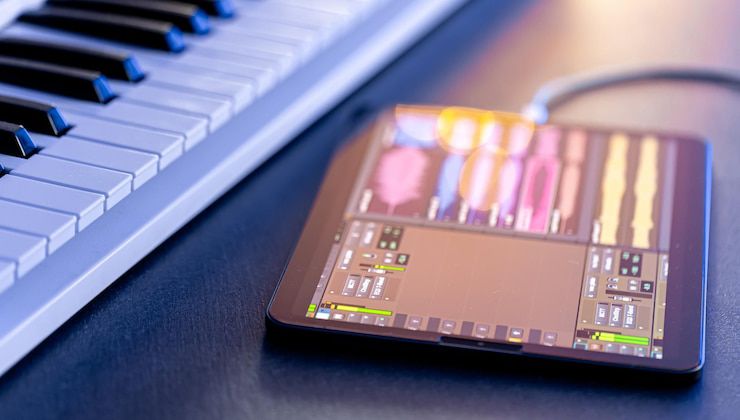How AI Tools Are Changing Music Production for Indie Artists
in recent years, the music industry has witnessed a major transformation — not through a new genre or superstar — but through the rise of artificial intelligence (AI). For independent (indie) artists, AI tools have become game-changers. These technologies are breaking down barriers that once limited access to high-quality production, allowing artists to create, mix, master, and distribute their music more efficiently and affordably.

Music Recording Studio In Punjab
Let’s explore how AI tools are revolutionizing music production for indie artists in 2025 and beyond.
1. Affordable and Accessible Music Creation
Traditionally, producing music required access to expensive studio time, sound engineers, and top-tier equipment. This made it difficult for indie artists with limited budgets to compete with major label musicians. AI has changed that by offering affordable tools that handle tasks like:
- Beat generation (e.g., Amper Music, Soundraw)
- Melody and chord progression suggestions (e.g., AIVA, Orb Composer)
- Virtual instruments and vocal synthesizers (like Vocaloid or Synthesizer V)
With just a laptop and internet connection, artists can now create studio-quality tracks using AI-powered software. This democratization of music production is allowing more diverse voices and sounds to emerge across platforms like Spotify, YouTube, and TikTok.
- AI-Assisted Mixing and Mastering
Mixing and mastering used to be the domain of audio engineers, requiring years of training and expensive gear. Today, indie artists are turning to AI-based platforms like:
- LANDR
- iZotope Ozone
- CloudBounce
These tools use machine learning to analyze your track and automatically apply the right compression, EQ, stereo widening, and volume balancing — all in minutes. For an indie musician on a deadline or tight budget, these tools offer a huge advantage, ensuring professional-sounding tracks without the cost of hiring an engineer.
- Intelligent Songwriting Assistance
AI tools don’t just help with sound — they’re now co-writers, too. Indie artists often face creative blocks when writing lyrics or melodies. AI can help by offering:
- Lyric suggestions and theme generation (like These Lyrics Do Not Exist or ChatGPT)
- Chorus or verse structure ideas
- Rhyme and rhythm matching
These tools don’t replace creativity but act as collaborative assistants. For example, an artist might input a mood or story idea, and the AI can suggest lyrical frameworks to build upon.
- Real-Time Feedback and Iteration
AI tools are also providing real-time feedback on audio quality, musical arrangement, and listener compatibility. For example, AI can analyze your track and let you know if:
- The vocals are buried in the mix
- The tempo is too fast for the genre
- The instrumentation matches current chart trends
This feedback loop allows indie musicians to improve their music faster and reduce trial-and-error time, which is especially valuable for solo artists without a team of producers or A&R reps.

- AI-Driven Music Marketing and Distribution
Beyond creation, AI is helping artists promote their music smarter. Tools like:
- Chartmetric (for market insights)
- Musixmatch AI tools (for lyrics optimization)
- PlaylistSupply (to find playlist curators)
- Spotify for Artists AI analytics
…help artists identify what works, where their fans are located, and when to release new music for maximum impact.
Additionally, AI tools assist with:
- Creating promotional content (e.g., video snippets using AI editors)
- Running targeted ads on platforms like Facebook, Instagram, or TikTok using machine learning
- Understanding listener behavior to predict future trends
- Voice and Sound Style Cloning
Another futuristic use of AI is voice cloning and sound imitation. AI tools can now replicate the tone and style of famous singers or instruments, allowing artists to experiment with different voices, genres, and textures. This is especially helpful for indie producers working on demos or trying out multiple versions of a song.
While there are ethical concerns (e.g., impersonating artists), when used responsibly, these tools open creative doors for indie musicians to explore new sonic landscapes.
- Collaborative Possibilities Across Borders
AI also allows real-time collaboration with other artists around the world. By using cloud-based DAWs (Digital Audio Workstations) powered by AI, musicians can:
- Co-produce tracks remotely
- Translate lyrics into different languages
- Use AI to synchronize instruments or harmonies in real-time
This increases the global reach of indie artists and promotes international collaboration, breaking cultural and logistical barriers.
Potential Challenges and Things to Watch
While AI is a massive boost to indie artists, it’s important to stay aware of the challenges:
- Over-reliance on automation: Creativity may become too formulaic if you depend too much on AI.
- Loss of originality: If too many artists use the same AI tools, the music may start sounding similar.
- Ethical concerns: Using AI to clone voices or styles may raise copyright or authenticity issues.
- Ownership: Who owns AI-generated music? Artists must understand licensing terms when using these tools.
Still, when used responsibly, AI enhances creativity — it doesn’t replace it.
Final Thoughts
In 2025, AI is no longer the future of music — it’s the present. For indie artists, it offers a rare opportunity to level the playing field with big labels. With access to AI-powered production, songwriting, and promotion tools, anyone can now turn a musical idea into a global release from their bedroom.
At Maa Records, we encourage indie artists to embrace AI while staying true to their unique voice. Technology is just a tool — your creativity and authenticity will always be the heart of your music.

No Responses